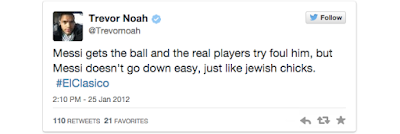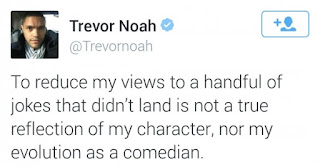When Jon Stewart announced he would be leaving The Daily Show, liberal Americans all over went into mourning. But we also had hope. Nobody wanted to see our favorite arbiter of satire about the media go, but we all did, I think, hope that the show would bring more diversity to late night. Comedy Central had already shown an interest in doing this when Stephen Colbert's show was replaced with a show by Daily Show correspondent Larry Wilmore, The Nightly Show, a very funny and politically savvy African American comedian. Quite a few of us were rooting for a new, much-needed woman to join the late night talk show scene, which has been femaleless since Chelsea Handler left E! in 2014. I know I personally wanted Samantha Bee, long-time writer and correspondent on the show, to take the reigns. One has to wonder if her departure from The Daily Show earlier this year had to do with being passed over. I would have been pretty happy with Aasif Mandvi or Al Madrigal. But what happened, nobody expected.
In March, Comedy Central announced that the new host of one of their flagship shows would be Trevor Noah. The world said a collective "Who?" OK. So he actually had appeared on a couple of episodes prior to the announcement, but this clearly wasn't internal hiring at it's best. The good news - he is a biracial African man - literally from South Africa so he was able to bring an international flare to the show, as well.
Shortly after the announcement, Noah was hit with charges of racism and sexism because of a series of tweets he made in the past:
In response to the controversy, Noah tweeted this:
This is, of course, a ridiculous statement and not an apology. In an interview in GQ he said
"You show me half my jokes from even two years ago, three years ago—I hate them...Because you see, like, a young version of yourself. You’re like, ‘Why would you say that? You idiot! That makes no sense.’ Or, ‘That’s just stupid.’ Or, ‘Ahh, I can’t believe I said that about a woman.’ You should not like what you did back then, because that shows that you’ve grown. If you’re still doing it, that’s a scarier place to be. So that’s a great thing for me. When I get a chance to look back and go: ‘I was an idiot.’ ”
This is an even more egregious statement in suggesting that 2-3 years ago is "a young version of yourself." Don't get me wrong. I firmly believe that people shouldn't be held accountable to things they said when they were younger and less informed. But 2-3 years? Note - there is still no apology in this response, either.
So, I decided I wouldn't watch the show. I understand that Jon Stewart, who I adore, supports him publicly and that he has real support from a lot of people that I respect, but I didn't think I could look at him and not think about these awful statements. But Monday night, pretty much by accident, I ended up watching the premiere episode. I decided to be open-minded. I would give him a chance to win me over and try to let the other stuff go. Maybe it would be considered a bad feminist by supporting him, but I wasn't going to restrict myself from something that would bring me laughs to be politically correct. Well, at least, I hadn't decided if I would do that yet.
Now, I feel much better. Why? Because now I can say I won't watch the show anymore because it's just not funny. There were a few moments that I chuckled at, but both were in response to the correspondents Jordan Klepper and, especially, Roy Wood, Jr. Noah has made such a fuss about the fact that he doesn't want to be another Jon Stewart, and he certainly isn't, but boy was he trying hard to be. Usually, when a show like this switches hosts, the new host completely revamps everything with new segments, new on-air support, new writers and a new agenda. Not Trevor Noah!
It's clear he is using Stewart's writers because all the jokes were written specifically for Stewart's delivery style, which Noah did not nail. He also tried to buddy up and hyperbolically praise his guest, Kevin Hart, in Stewart fashion, but bungled that too, leading many audiences to find the whole thing uncomfortable. He also tried Stewart's comedic "spit take," which was just sad. And, of course, Stewart's trademark bit, "Your moment of Zen" was tacked on at the end, and contrary to what I'm sure they intended, which would be to show viewers that they wouldn't lose these familiar favorite segments, it just made me miss Jon Stewart more.
I planned on giving Noah another chance, but most reviews are still pretty bad, so I'm in no hurry. If they get better I might try again. But honestly, I've lost a lot of respect for Comedy Central for their response to the controversy and have no respect for his responses, so maybe I'll just keep feeling good about the fact that the show wasn't any good and let myself off the hook from ever having to think about him again.






